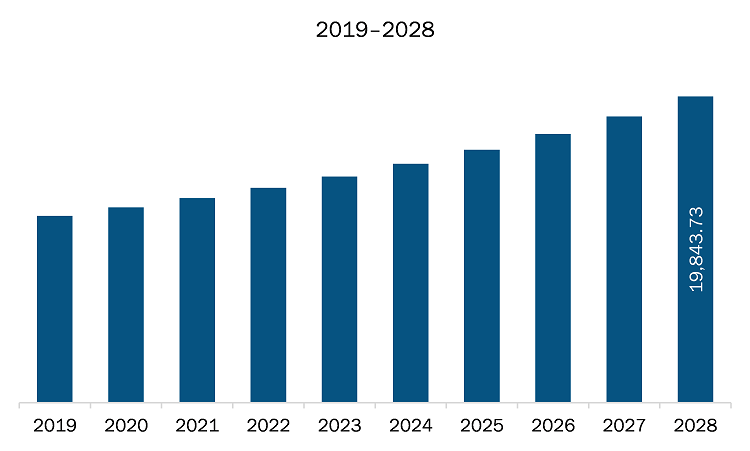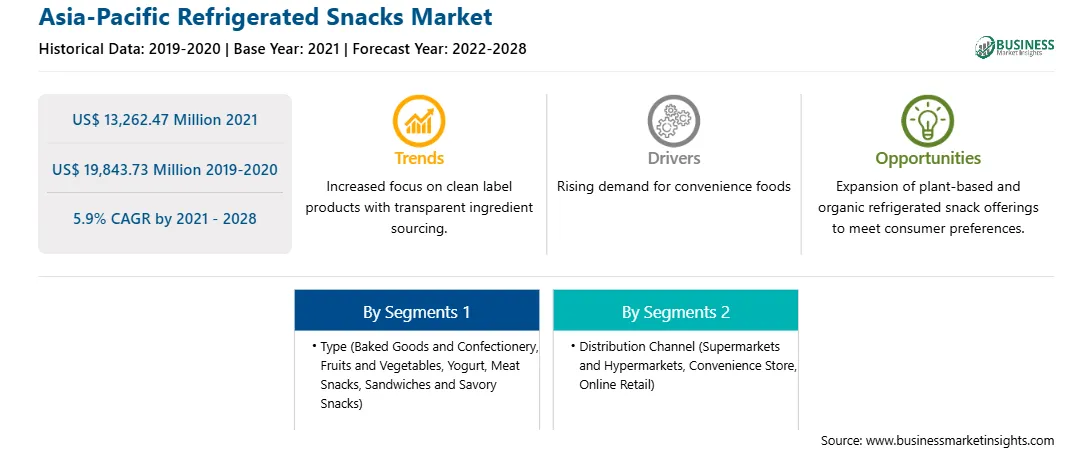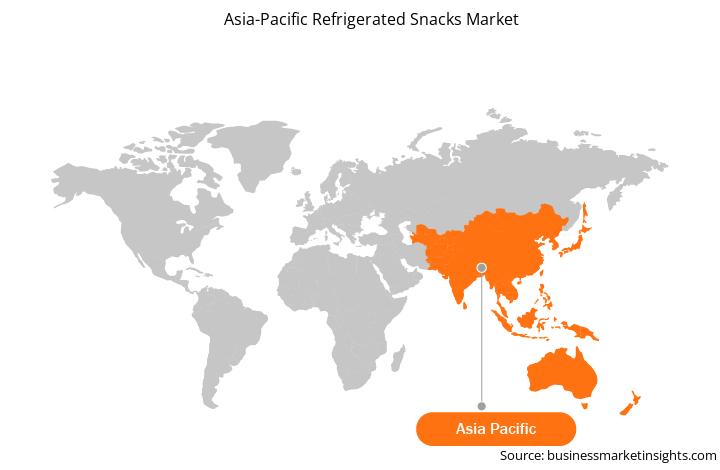Asia Pacific comprises several developing economies, such as China, Japan, South Korea, and Australia. These developed countries are witnessing rapid growth in the middle-class population, along with a change in dietary patterns, which offers several opportunities for the key market players in the refrigerated snacks market. The food processing industries in the countries of Asia Pacific have experienced a huge shift over the years. Due to the ever-increasing disposable income of the middle-income group population, people are willing to pay higher prices for food products, such as refrigerated snacks and other processed food products. Factors such as changing consumer taste preferences and increasing demand for processed food products, as well as the availability of numerous product variants, have boosted the growth of the refrigerated snacks market in Asia Pacific. Also, the growing demand for refrigerated snacks among health-conscious consumers owing to the rising preference for convenience food is further projected to propel the market growth during the forecast period. Increasingly busy urban lifestyles in Asia Pacific have resulted in consumers opting for convenient food that does require less time for cooking or preparation. The rising preference for ready-to-eat meals is fueling the growth of the refrigerated snacks products market.
The COVID-19 outbreak is anticipated to cause a significant economic loss in APAC. The consequence and impact are likely to worsen with the spread of the virus. The governments of various APAC countries-imposed lockdowns in early 2020 to restrict the spread of the virus, which, in turn, negatively impacted the production of refrigerated snacks. The governments have asked the food and beverage manufacturers to delay their production, which has been adversely affected the global supply of food, including refrigerated snacks. However, in 2021, the government of different countries in APAC are now offering vaccination to people and taking precautionary measures to protect people against the spread of Covid-19. The governments of APAC countries have realigned their operations, restructured their production facilities, and procured raw materials required for refrigerated snacks in advance to avoid an imbalance between supply and demand. Also, e-commerce network is playing a major role in food product distribution during the pandemic, and people mostly prefer buying products online.

Strategic insights for the Asia-Pacific Refrigerated Snacks provides data-driven analysis of the industry landscape, including current trends, key players, and regional nuances. These insights offer actionable recommendations, enabling readers to differentiate themselves from competitors by identifying untapped segments or developing unique value propositions. Leveraging data analytics, these insights help industry players anticipate the market shifts, whether investors, manufacturers, or other stakeholders. A future-oriented perspective is essential, helping stakeholders anticipate market shifts and position themselves for long-term success in this dynamic region. Ultimately, effective strategic insights empower readers to make informed decisions that drive profitability and achieve their business objectives within the market.

| Report Attribute | Details |
|---|---|
| Market size in 2021 | US$ 13,262.47 Million |
| Market Size by 2028 | US$ 19,843.73 Million |
| Global CAGR (2021 - 2028) | 5.9% |
| Historical Data | 2019-2020 |
| Forecast period | 2022-2028 |
| Segments Covered |
By Type
|
| Regions and Countries Covered | Asia-Pacific
|
| Market leaders and key company profiles |
The geographic scope of the Asia-Pacific Refrigerated Snacks refers to the specific areas in which a business operates and competes. Understanding local distinctions, such as diverse consumer preferences (e.g., demand for specific plug types or battery backup durations), varying economic conditions, and regulatory environments, is crucial for tailoring strategies to specific markets. Businesses can expand their reach by identifying underserved areas or adapting their offerings to meet local demands. A clear market focus allows for more effective resource allocation, targeted marketing campaigns, and better positioning against local competitors, ultimately driving growth in those targeted areas.

The refrigerated snacks market in APAC is expected to grow from US$ 13,262.47 million in 2021 to US$ 19,843.73 million by 2028; it is estimated to grow at a CAGR of 5.9% from 2021 to 2028. Rise in demand for convenience foods; There is a surge in demand for refrigerated snacks attributable to the rise in purchasing power along with growing consumer preference toward healthy and ready-to-eat convenience food items. Further, with the growing food &beverages industry, rise in the working population, and wider product availability through both online and offline retailing, consumers are inclining more toward convenience foods. Refrigerated snacks are readily available in retail outlets or stores and are increasingly being used as a condiment to add taste, texture, and nutrition to the food product in which they are used. Consumers are inclining over fresher and less processed products that are equally healthy and nutritious and can be directly consumed. With the expansion of the distribution network, convenience foods have gained a shelf in the supermarkets & retail outlets. Additionally, the change in working demographics along with busy lifestyles is among the other factors promoting the demand for convenience food items. With the increase in the demand for convenience food items, the need for refrigerated snacks is set to propel. These snacks offered ease of use, easy to carry in a small space and provide nutrients, due to which some people prefer to have it rather than a proper meal. Furthermore, the surge in population in economies like India and China, diversification in food habits, and exposure to global food brands are creating the demand for refrigerated snacks. Companies are delivering products with the improved quality of refrigerated snacks and efficient distribution channels to serve the broader customer base to meet the increasing demands. This is bolstering the growth of the refrigerated snacks market.
In terms of type, the fruits and vegetables segment accounted for the largest share of the APAC refrigerated snacks market in 2020. In terms of distribution channel, the supermarkets and hypermarkets segment held a larger market share of the refrigerated snacks market in 2020.
A few major primary and secondary sources referred to for preparing this report on the refrigerated snacks market in APAC are company websites, annual reports, financial reports, national government documents, and statistical database, among others. Major companies listed in the report are Danone S.A.; General Mills Inc.; Hormel Foods Corporation; Mars Incorporated; Mondelez International, Inc.; Nestle S.A; PepsiCo; The Kraft Heinz Company; among others.
The Asia-Pacific Refrigerated Snacks Market is valued at US$ 13,262.47 Million in 2021, it is projected to reach US$ 19,843.73 Million by 2028.
As per our report Asia-Pacific Refrigerated Snacks Market, the market size is valued at US$ 13,262.47 Million in 2021, projecting it to reach US$ 19,843.73 Million by 2028. This translates to a CAGR of approximately 5.9% during the forecast period.
The Asia-Pacific Refrigerated Snacks Market report typically cover these key segments-
The historic period, base year, and forecast period can vary slightly depending on the specific market research report. However, for the Asia-Pacific Refrigerated Snacks Market report:
The Asia-Pacific Refrigerated Snacks Market is populated by several key players, each contributing to its growth and innovation. Some of the major players include:
The Asia-Pacific Refrigerated Snacks Market report is valuable for diverse stakeholders, including:
Essentially, anyone involved in or considering involvement in the Asia-Pacific Refrigerated Snacks Market value chain can benefit from the information contained in a comprehensive market report.